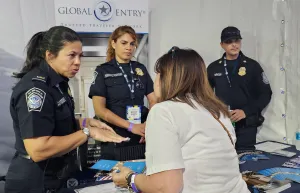SAN JUAN, Puerto Rico – U.S. Customs and Border Protection (CBP) operations in the Caribbean issued a public recommendation today for travelers, as an increase in the number of international arrivals is expected to start this weekend as part of the spring travel season.
With the arrival of spring, and numerous travel experiences across the Caribbean, there is an anticipated increment in the number of international arrivals to its airports, as well as private vessel entries traversing the islands in the West Indies into the United States.
“We ask travelers to be aware and ready in order to avoid long lines and inconveniences at the airports, and warrant boaters to report their entry by sea into US territory,” shared Roberto Vaquero, Director of Field Operations for Puerto Rico, and the US Virgin Islands. “Understand that CBP officers can inspect you and your personal belongings, to enforce our laws as well as protect legitimate travelers.”
Travelers can know how to clear customs. Among the things travelers should be aware of are:
- Have all the required travel documents for the country you are visiting, as well as identification for re-entry to the United States. Passport books are required for all international travel by air. Other options such as the U.S. passport card, trusted traveler cards, border crossing card and permanent resident card can be used to enter the United States from Canada, Mexico, the Caribbean, and Bermuda at land or seaports.
- For citizens of Visa Waiver Program countries traveling to the U.S., make sure that you have an approved Electronic System for Travel Authorization (ESTA) before boarding.
- Upon reaching CBP processing declare everything you are bringing from abroad, even if you bought it in a duty-free shop. Know that things bought abroad for personal use or as gifts may be eligible for duty exemptions. If you are bringing them back for resale, they are not.
- Know the difference between prohibited merchandise (which is forbidden by law to enter the U.S.) and restricted merchandise (items needing special permit to be allowed into the U.S.). For more information, please visit the Restricted/Prohibited section of the CBP website.
- All agriculture items must be declared and are subject to inspection by a CBP Agriculture Specialist at ports of entry to ensure they are free of plant pests and foreign animal diseases.
- Monitor border wait times for various ports of entry. Travelers are encouraged to plan their trips during periods of lighter traffic or to use an alternate, less heavily traveled port of entry. For more information, travelers can find up to date wait time information on the CBP website.
At airports, program members proceed to Global Entry kiosks, present their machine-readable passport or U.S. permanent resident card, place their fingerprints on the scanner for fingerprint verification and complete a customs declaration. The kiosk issues the traveler a transaction receipt and directs the traveler to baggage claim and the exit.
Enrollment on Arrival (EoA) is CBP program that allows Global Entry applicants who are conditionally approved to complete their interviews upon arrival into the United States. The EoA program eliminates the need for a Global Entry applicant to schedule an interview at an enrollment center to complete the application process.
In the sea environment, operators of small pleasure vessels, arriving in the United States from a foreign port or place to include any vessel which has visited a hovering vessel or received merchandise outside the territorial sea, are required to report their arrival to CBP immediately (see 19 U.S.C. 1433). The master of the vessel reports their arrival at the nearest CBP facility or such other place as the Secretary may prescribe by regulations.
CBP ROAM™ is a free mobile application that provides an option for pleasure boaters to report their U.S. entry to CBP via their personal smart device or a tablet located at local businesses to satisfy reporting requirements. ROAM is available in the Caribbean and you can download the app from the Apple App Store or the Google Play Store.
Please visit www.cbp.gov to view additional news releases and other information pertaining to Customs and Border Protection. Follow us on Twitter at @CBP Caribbean and @DFOSanJuan.


